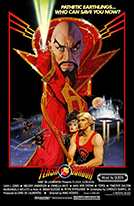Flash Gordon

| Original title: | Flash Gordon |
| Director: | Mike Hodges |
| Release: | Cinema |
| Running time: | 114 minutes |
| Release date: | 05 december 1980 |
| Rating: |
Mulder's Review
Flash Gordon, directed by Mike Hodges, is a bold, lively adaptation of Alex Raymond's 1930s comic strip. This cinematic spectacle, produced by Dino De Laurentiis, is a delightful amalgam of kitsch and high adventure. The film's journey to the screen was marked by numerous creative changes, with directors such as Federico Fellini and Nicolas Roeg initially considered before Mike Hodges, best known for the British classic Get Carter, took the reins. The screenplay, conceived by Lorenzo Semple Jr, infuses the narrative with a self-centered, deadpan humor that resonates with the film's comic-book origins. Flash Gordon's charm lies in its unabashed embrace of its comic roots, making it a beloved cult classic.
The story of Flash Gordon is both simple and captivating. The story begins when Earth is attacked by the tyrannical Emperor Ming the Merciless, played with delightful malevolence by Max von Sydow. Flash Gordon, played by Sam J. Jones, is an American quarterback for the New York Jets who, along with journalist Dale Arden (Melody Anderson) and mad scientist Dr. Hans Zarkov (Topol), is unwittingly plunged into an intergalactic battle to save the planet. The film's plot is the quintessential hero's journey, where Flash's inherent goodness and athletic prowess are his main assets in the fight against the otherworldly threats posed by Ming. The character of Flash embodies the American ideal of bravery and ingenuity, making him an endearing protagonist.
Ming the Merciless is the ultimate villain, whose menacing presence is enhanced by von Sydow's masterful performance. Supporting actors, including Brian Blessed as the exuberant Prince Vultan and Timothy Dalton as the suave Prince Barin, add to the film's eclectic charm. Blessed's portrayal of Vultan, with his memorable line "Is Gordon alive?", and Dalton's sophisticated portrayal of Barin give the film a mix of humor and gravity. Character interaction and vibrant performances contribute significantly to the film's enduring appeal.
Visually, Flash Gordon is a feast for the eyes. Danilo Donati's production design is a vibrant homage to the original comic strip, with exaggerated sets and costumes that give a retro-futuristic feel. The use of Technicolor and 2D studio sets for the alien planets lends the film an aesthetic that is both nostalgic and surreal. Every frame is infused with vivid color, creating a psychedelic visual experience that reflects the imaginative scope of the comic strip. This distinct visual style sets Flash Gordon apart from other sci-fi films of its time, offering a unique visual experience that is both nostalgic and fresh.
The film's soundtrack, composed by the legendary rock band Queen, is another highlight. The energetic, operatic music perfectly complements the film's action and drama, elevating scenes to epic proportions. The main theme, with its iconic refrain "Flash! Ah-ah, savior of the universe!", has become a cultural landmark, synonymous with the film's exuberant spirit. Queen's music infuses the film with a dynamic energy that enhances its narrative and visual elements, making the soundtrack an integral part of Flash Gordon's legacy.
Thematically, Flash Gordon explores the classic motifs of good versus evil, freedom versus tyranny and innocence versus corruption. Flash's journey from ordinary human to galactic hero reflects the archetypal hero's journey, underscored by themes of unity and resistance to oppression. The film's self-conscious humor sets it apart from other sci-fi adventures, embracing its absurdity with a playful, almost parodic approach. This is evident in the exaggerated performances, whimsical dialogue and overtly theatrical scenarios, which add layers of humor and irony to the narrative.
On its release, Flash Gordon received mixed reviews, particularly in the U.S., where its ironic tone clashed with contemporary tastes. By contrast, the film found a more immediate and lasting resonance in the UK, where it resonated with the nation's love of pantomime and self-aware humor. Over the decades, the film has garnered a devoted fan base, who celebrate its wacky charm and exuberant storytelling. Flash Gordon's influence is evident in various aspects of modern pop culture, from the comic-book opening montage that inspired the signature opening sequence of Marvel films, to the mix of retro aesthetics and contemporary updates.
Flash Gordon's enduring legacy is a testament to its unique blend of comedy, humor and high adventure. While its initial reception was mixed, the film's enduring popularity and cultural impact underscore its charm and creativity. Flash Gordon is a cinematic experience that embraces outrage and revels in its own absurdity, resulting in a film as entertaining as it is distinctive. Whether viewers laugh with it or against it, Flash Gordon remains a beloved classic, offering a vibrant and joyous journey through the cosmos. Its blend of witty humor, bold imagery and epic music creates a cinematic tapestry that continues to captivate audiences, ensuring its place among timeless cult classics.
Flash Gordon
Directed by Mike Hodges
Written by Lorenzo Semple Jr.
Adaptation by Michael Allin
Based on Characters by Alex Raymond
Produced by Dino De Laurentiis
Starring Sam J. Jones, Melody Anderson, Ornella Muti, Max von Sydow, Topol, Timothy Dalton, Mariangela Melato, Brian Blessed, Peter Wyngarde, Peter Duncan
Cinematography : Gilbert Taylor
Edited by Malcolm Cooke
Music by Queen, Howard Blake
Production companies: Starling Productions, Famous Films
Distributed by Universal Pictures (United States, France)
Release dates 5 December 1980 (United States), 28 January 1981 (France)
Running time : 114 minutes
Revised June 23, 2024
Mulder's Mark:

